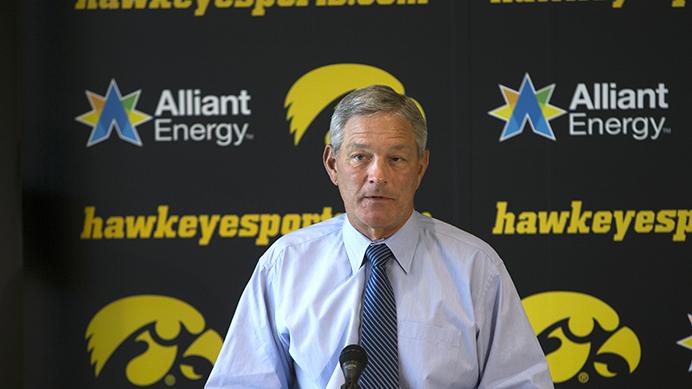On Tuesday, the Hawkeye football team sent out its official scholarship letters, which featured a familiar rule that plagued the Hawkeyes last year.
By Jordan Zuniga
The Hawkeyes are an old-school football team, in an old-school conference, with an old-school coach.
If the Iowa football team were a person, it would still use CD players to listen to music.
Most of the time, this old-school style is endearing, and fans like it. They believe that Iowa plays football the way it is supposed to be played.
One major pitfall was outlined last fall, when the No.7 running-back recruit in the nation, Eno Benjamin, decommitted from Iowa after he breached its no-visit rule for recruits who had already committed to play at the school.
Losing Benjamin the way Iowa did was especially disappointing; he was a player trying to get other players to join the Hawkeyes with him, and the entire situation probably could’ve been resolved.
It is a loss that could have consequences for the Hawkeyes down the road; the Hawkeyes have not yet been able to recruit a running back anywhere near the talent level of Benjamin.
Iowa’s bleeding did not stop after Benjamin’s departure. Fellow four-star recruit Chevin Calloway decommitted after violating the same policy, and later, Gavin Holms, a three-star wide receiver, followed suit.
Holms directly cited the Hawkeyes policy and the situation with Benjamin as the reason for his departure on Twitter.
RELATED: Ferentz unveils leadership team for 2017
“I’ve had a change of heart and realized that maybe Iowa isn’t my fit,” Holms wrote on his account in November. “The whole situation with my [friend] Eno and Iowa’s policy … didn’t sit very well with me.”
The entire situation cast a negative light on the historic Iowa football program, and many thought last year’s embarrassment would spark a change for this year’s recruits.
Tuesday was the first day schools could send scholarship letters to recruits, and the first condition for Iowa’s scholarship is, “You must not visit another institution (officially or unofficially).”
Coach Kirk Ferentz and the Hawkeyes are as stubborn as ever and oblivious to some of the changes that are occurring around them.
Iowa’s “no-visit” policy made more sense 15 years or so ago, when many teams would not start recruiting players until their senior year in high school, and up to a few years ago, a few other major programs had a similar rule.
Now, it is hard to find another policy that resembles Iowa’s in a major program, because it has become far more common for teams to offer scholarships to high-schoolers as sophomores and juniors. That rendered the rule impractical because high-schoolers can be committed to a school for several years.
Ferentz has been superb about jumping on recruits early; he had 11 orbal commitments before the official scholarships went out Tuesday. However, this tactic can prove detrimental when coupled with the no-visit rule.
Most prominent recruits are constantly bombarded by other schools trying to recruit them all the way through National Signing Day.
This makes it difficult for kids to resist visiting another school, especially when college visits mean mini-vacations and a day off from school. What high-school kid says no to that?
Iowa’s coaching staff will argue that recruits should stick to their word and once they commit to Iowa, the coaching staff has committed to them.
There is definitely some validity to that statement, but with recruits being teenagers forced to make decisions that could affect the rest of their lives, some indecision should be expected.
Hopefully, the rule won’t be a huge detriment for the incoming 2018 class, but Hawkeyes need to change the rule soon if they hope to avoid more recruiting disasters that mirror last year’s.



